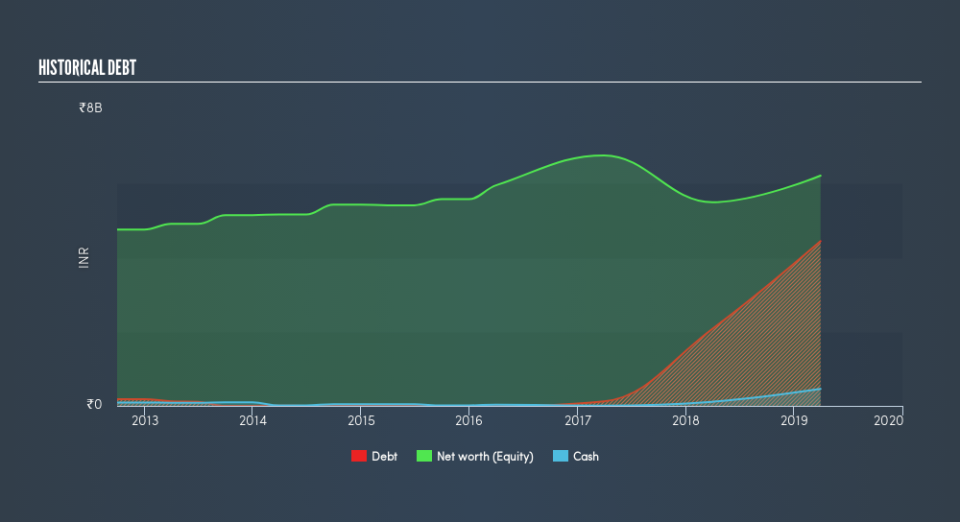Is Marathon Nextgen Realty (NSE:MARATHON) Using Too Much Debt?

David Iben put it well when he said, 'Volatility is not a risk we care about. What we care about is avoiding the permanent loss of capital.' When we think about how risky a company is, we always like to look at its use of debt, since debt overload can lead to ruin. Importantly, Marathon Nextgen Realty Limited (NSE:MARATHON) does carry debt. But should shareholders be worried about its use of debt?
Why Does Debt Bring Risk?
Debt and other liabilities become risky for a business when it cannot easily fulfill those obligations, either with free cash flow or by raising capital at an attractive price. In the worst case scenario, a company can go bankrupt if it cannot pay its creditors. While that is not too common, we often do see indebted companies permanently diluting shareholders because lenders force them to raise capital at a distressed price. Of course, the upside of debt is that it often represents cheap capital, especially when it replaces dilution in a company with the ability to reinvest at high rates of return. The first thing to do when considering how much debt a business uses is to look at its cash and debt together.
See our latest analysis for Marathon Nextgen Realty
How Much Debt Does Marathon Nextgen Realty Carry?
You can click the graphic below for the historical numbers, but it shows that as of March 2019 Marathon Nextgen Realty had ₹4.44b of debt, an increase on ₹2.08b, over one year. On the flip side, it has ₹457.7m in cash leading to net debt of about ₹3.99b.
How Strong Is Marathon Nextgen Realty's Balance Sheet?
According to the last reported balance sheet, Marathon Nextgen Realty had liabilities of ₹5.16b due within 12 months, and liabilities of ₹3.60b due beyond 12 months. Offsetting this, it had ₹457.7m in cash and ₹2.27b in receivables that were due within 12 months. So its liabilities total ₹6.04b more than the combination of its cash and short-term receivables.
The deficiency here weighs heavily on the ₹3.38b company itself, as if a child were struggling under the weight of an enormous back-pack full of books, his sports gear, and a trumpet. So we definitely think shareholders need to watch this one closely. After all, Marathon Nextgen Realty would likely require a major re-capitalisation if it had to pay its creditors today.
In order to size up a company's debt relative to its earnings, we calculate its net debt divided by its earnings before interest, tax, depreciation, and amortization (EBITDA) and its earnings before interest and tax (EBIT) divided by its interest expense (its interest cover). Thus we consider debt relative to earnings both with and without depreciation and amortization expenses.
Marathon Nextgen Realty shareholders face the double whammy of a high net debt to EBITDA ratio (7.8), and fairly weak interest coverage, since EBIT is just 2.4 times the interest expense. The debt burden here is substantial. One redeeming factor for Marathon Nextgen Realty is that it turned last year's EBIT loss into a gain of ₹503m, over the last twelve months. When analysing debt levels, the balance sheet is the obvious place to start. But you can't view debt in total isolation; since Marathon Nextgen Realty will need earnings to service that debt. So if you're keen to discover more about its earnings, it might be worth checking out this graph of its long term earnings trend.
Finally, a company can only pay off debt with cold hard cash, not accounting profits. So it's worth checking how much of the earnings before interest and tax (EBIT) is backed by free cash flow. Happily for any shareholders, Marathon Nextgen Realty actually produced more free cash flow than EBIT over the last year. That sort of strong cash conversion gets us as excited as the crowd when the beat drops at a Daft Punk concert.
Our View
To be frank both Marathon Nextgen Realty's net debt to EBITDA and its track record of staying on top of its total liabilities make us rather uncomfortable with its debt levels. But on the bright side, its conversion of EBIT to free cash flow is a good sign, and makes us more optimistic. Looking at the bigger picture, it seems clear to us that Marathon Nextgen Realty's use of debt is creating risks for the company. If all goes well, that should boost returns, but on the flip side, the risk of permanent capital loss is elevated by the debt. Over time, share prices tend to follow earnings per share, so if you're interested in Marathon Nextgen Realty, you may well want to click here to check an interactive graph of its earnings per share history.
At the end of the day, it's often better to focus on companies that are free from net debt. You can access our special list of such companies (all with a track record of profit growth). It's free.
We aim to bring you long-term focused research analysis driven by fundamental data. Note that our analysis may not factor in the latest price-sensitive company announcements or qualitative material.
If you spot an error that warrants correction, please contact the editor at editorial-team@simplywallst.com. This article by Simply Wall St is general in nature. It does not constitute a recommendation to buy or sell any stock, and does not take account of your objectives, or your financial situation. Simply Wall St has no position in the stocks mentioned. Thank you for reading.


